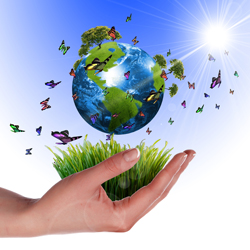Sexual health gets broad coverage because it’s safe and respectable. Builds the immune system? Yep. Good for the heart: check. Relieves menstrual cramps and depression: double check. Sex bonds us through the oxytocin-dopamine cascade: check again. We know healthy people have more sex, and having good clean fun may help you live longer too. Orgasms are great for body and mind, and caresses feed our skin hunger. Check, check, check.
Keep it clinical and we avoid the messy truth of our secret erotic selves. One of those is this: we are making love in environmental dumps.
That is why I can think of few expressions of love more meaningful than going green. From making love organically, to ending our romance with plastics and falling in love with nature, Ecosex has the potential to revolutionize our relationships.
There’s no single abiding definition of Ecosex, though there’s plenty of juicy talk about the movement. Annie Sprinkle’s and Beth Stephens’ manifesto invites us to view Earth as a lover, one we are madly, passionately in love with. I agree – it’s time we see stars in our eyes when we behold our world. Having a life long love affair with our blue globe becomes essential to our understanding of holistic sexuality.
For most readers, especially those who’ve never heard the word before (consider yourself deflowered), a practical definition helps:
I define Ecosex as the recognition and adaptation of environmentally friendly products and behaviors that benefit lovers and the planet, reduce harm to both, emphasize pleasure without compromise and advocate for healthy alternatives to every aspect of reproductive health and well-being.
Here’s something novel about the Ecosexy Label: anyone can wear it. You can be straight, monogamous and long-time married and care about the planet. You can support alternative sexualove styles and want to make Mama Earth your next lover. You can be a child of God/Goddess, a diehard non-believer, a smitten kitten and a choir singer and get at a fundamental level that we are nature; we are part of this web of miraculous life; and we share one planetary home.
Everyone benefits from greening his or her intimate landscape.
A funny thing happens on the way to Ecosex. You start viewing yourself and the world from a new consciousness. Everything takes on hues of green, blue and earthly delight. You become incredibly self-focused on your private ecosystem, so much so that a miracle can happen. Viewing your body as a natural wonder changes how you treat the world.
For example, did you know that up to 43 percent of American women experience a sexual dysfunction? Most don’t realize that environmental toxins can inhibit sexual vitality. Few researchers examine sexual dysfunction through environmental lenses. Pharmaceutical companies want to throw pills at our privates. We are coupling in a toxic soup, hardly a fitting place to express our love.
When you discover that toxins are eating your sex life, you take a meaningful step towards recuperative (sexual) well-being.
The excerpt below is from my newly released eBook, People Planet Pleasure Purpose: Five Meaningful Ways to Embody Eco-Conscious Intimacy:
“Others have reclaimed sexual health through Ecosex. People like Amy Marsh, PhD, author and clinical educator whose miscarriage plunged her into ‘the investigation of toxic chemicals and their effect on human reproduction.’ Her research on teratogens, mutagens and reproductive hazards led her to conclude that, ‘toxins ate her sex life.’
“A clinical sexologist, Dr. Marsh insists that professionals ‘need to ask our clients about occupational exposures and toxic product use as part of our intake process.’ She acknowledges that research is still lacking. ‘We don’t have studies to rely on yet, but this kind of scrutiny in a clinical setting may be of use to clients who present with vulvodynia, vaginismus, low libido, “allergies to semen,” and other problems.’”
Ecosex is a new direction in raising global eco-conscious awareness. When you get that, you become a different kind of consumer. Funky chemical names become puzzles to be deciphered in the name of pleasure and planetary stewardship. Appreciation for nature is re-born and environmentalism is re-affirmed because your sexualove depends on it.
In a recent
New York Times article, writer
Jane Brody writes about discovering the power of love two years after her husband’s death. Brody writes: “In study after study … people in loving relationships with spouses or friends were healthier than those lacking this intimacy, even when the latter had healthier living habits.”
She doesn’t just mean romantic love, but connections that span genitals and generations. She recalls fondly and substantiates fiercely a time when we lived side by side with grandparents and valued their wrinkles as testament to wisdom and history. Her thesis is solid, considerate and worthy of reading.
If there’s one thing I can add to Brody’s sage exploration into the importance of connections to our collective human experience, it is this: we are wired for companionship. Our greatest gifts aren’t that we are the fastest species on the planet; the one with the sharpest teeth, the deepest roots, the most muscle mass or even the biggest brain (dolphins brain’s are bigger than ours).
We may think that competition is human nature, and survival of the fittest rules and informs our world-view. However, even Darwin said something that’s often forgotten. Humans benefit from “the greater strength of the social or maternal instincts than that of any other instinct or motive.”
If he were alive today, I’d call Darwin an
ecosexual. He understood the bond between the natural world and our intimate landscapes. We are social beings. We need one another. When we decide that we want a relationship, we put our energy into it. We sustain what we want to sustain.
That’s Ecosex in a jade nutshell. For readers who want to learn more, please visit
TinamarieBernard.com and subscribe. A free copy of
People Planet Pleasure Purpose: Five Meaningful Ways to Embody Eco-Conscious Intimacy will be sent to you.





Comments